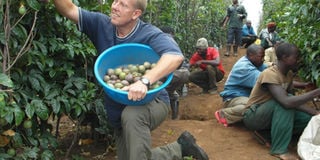Came as a tourist, stayed to grow passion fruits

fARMERS gathering passion fruits. FILE PHOTO
Jon Bennion–Pedley, 45, a British citizen staying in Kabale, has turned to growing passion fruits with the aim of creating employment to the locals and raise money for the education of 250 vulnerable and orphaned children under his J10:10 charity organisation.
The target is to generate Shs1b per year to support the children and emphasise their health and sanitation in the neighbouring communities.
He has hired 13 acres of land in Bigungiro village in Bubare Sub-county where he has planted about 13,000 passion fruits and employed 50 people whom he pays Shs150,000 per month.
Impart skills
Bennion–Pedley elaborates: “I started in May 2013 and invested about Shs200m of my savings from. In the last two seasons, I harvested about 10,000kgs of passion fruit which sold at Shs1,850 each kilo. My target is to roll out the skills on passion fruit growing to the local farmers so that they can supply our juice processing plant, which begins in 2016. I plan to hire more land so that I can be able to harvest 50,000kgs of passion fruits per year since they are two major seasons.”
Kabale, Kampala and Kigali form a ready market for the passion fruits from his farm. He plans to set up refrigerated warehouses in each of the three towns to avoid wastage.
He adds it has been easy to establish the passion fruit garden because of readily available materials to use as stakes on which the plants grow. Wires are used on wooden poles as stakes for the plants to climb on. A well-looked after plant can produce 30kg of passion fruits for about three years.
Irrigation
He reveals that his project is situated in Kabale specifically because of its cool climate but lack of water is the main challenge since his gardens are located on the hill tops.
There is a tank of 22,000 litre capacity on the farm to collect water, which is used for irrigation.
“We use mineral water bottles for drip irrigation. We place a plastic bottle with holes on the bottom at every plant and we refill them twice a week to ensure that the dry season does not affect our production,” he says.
Pruning of unwanted branches is done once a month to avoid bushy growth that retards fruit production. Organic manure is used during the planting season because the soils on the land had been exhausted.
Transfer knowledge
Patrick Tushabomwe, the workers’ team leader, says the community in Bigungiro have benefited from this project as employees and have been able to earn money to provide for their families.
He points out that some men who had resorted to drinking alcohol all day long because of lack of what to do, have stopped and are seriously engaged in passion fruit business.
Some workers have gained skills and have started small gardens in their homes to supplement their incomes.
“We have introduced the individual work responsibility policy where each employee is allocated about 300 passion fruit plants to ensure that they are well looked after in terms of watering, spraying and pruning. We did this to expose the employee to full care of the plant so that he can transfer the knowledge and start up his own,” Tushabomwe says.
Bennion–Pedley came to Kabale in 2007 as a tourist when he developed the idea because of the conducive climate and hospitality of the people.
He had been dealing in computer accessories in UK for more than 20 years. It is the proceeds from this business with which he begun this project in Kabale.
The future includes plans to establish a nursery bed where seedlings will be raised before being donated to the communities. Also, three water tanks are to be put up to help the communities solve the problem of water shortage during the dry season.




